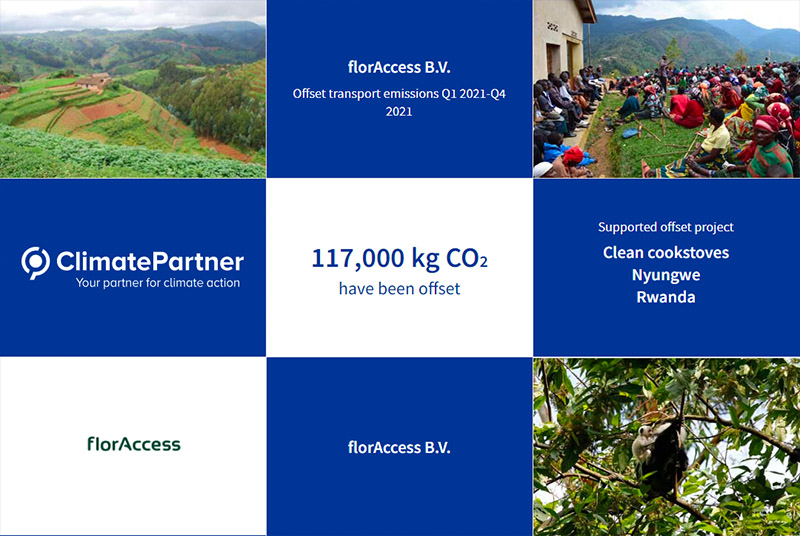Plants for Professionals.
Nature is important. We’ll do what we can do to help minimise the impact. For all of us. This is why we have decided to compensate for all our CO2 emissions caused by transport. This includes the transport from the growers to our logistics center, and to our clients. We compensate for more than 100 Megatonnes of CO2 every year.
To offset these emissions we have partnered with ClimatePartner. You can see what we have done so far on our Tracking ID. This will be updated every quarter.

Together we compensate - to benefit others and nature
The project we have chosen provides clean cookstoves in Nyungwe, Rwanda. At the moment people are using open fires for cooking. This uses a lot of firewood which puts pressure on the unique rainforests in the surrounding.
The stoves will only use a third of the fuel of the open fires. This means a cut in carbon emissions and lowered pressure on the ecosystem. The stoves are offered at a subsidized price so low-income households can afford them.
Nature is not all about CO2. There are more ways we help to move forward.
We are minimizing plant waste because we do not keep our own stock. All plants stay at the growers until an order is placed. At other wholesalers it is normal to have around 10% of the plants go to waste because they are not sold on time.
Where we can, we partner with transporters who deliver with electric vehicles.
Every year we increase our assortment of plastic free products. At the same time we try to lower the amount of plastic used in our logistic center, for instance by using wrapping which is 50% bio-based and thinner.
All of this is just a start. We will keep expanding until we have become a carbon-neutral company.
Our sustainability goals:
Offer 100% CO2 neutral transport to all our clients
Minimize plastic packaging both in our distribution hub and from the growers
Expand our assortment of plastic free, peat free and bio products
Receive a certification (ISO or other) for our carbon footprint calculation
Frequently Asked Questions regarding sustainability and FlorAccess
Carbon offset projects reduce the emissions of greenhouse gases to compensate for emissions made elsewhere. This can for example be done via the protection of ecosystems, reforestation or the development of renewable energy. These projects are often connected to other Sustainable development goals in the region like; providing local jobs, clean water, education, gender equality, and nature conservation.
For a project to be certified it needs to comply with internationally recognized criteria. To show that the criteria are met, projects are audited according to strict standards, such as ‘the Gold standard’ or the Verified carbon Standard’.
One of the most important requirements is that the projects are additional climate protection measures. Secondly, that the contribution to carbon reduction in the atmosphere is clearly measurable. The saved carbon emissions can only be used once. This is done via corresponding emission certificates in official registers.
Additionally, only projects that depend on additional financial resources can be certified as carbon offset projects. This means that they need to be dependent on the revenue from the traded emissions. Projects that are economically viable by themselves and would be realized without the certificate revenue cannot be used to offset carbon emissions.
The project we choose offsets emissions by providing more efficient cooking stoves to people in the Nyungwe region in Rwanda. These stoves emit only one third of the greenhouse gasses compared to the original stoves. They also lower the pressure on the ecosystem for fuel.
At the beginning of each quarter we calculate the transport emissions for the previous quarter. All these emissions are compensated in carbon credits from our project with ClimatePartner. All credits we have purchased up till now are visible on our Tracking ID.
We are currently not ISO certified. It is one of our goals to get our carbon footprint calculation certified.
ClimatePartner has a large portfolio of carbon offset projects and makes sure all criteria are met. We partnered with them to ensure that our investments have a real impact. You can visit their website here.
Frequently Asked Questions regarding Sustainability Certificates
This is a certificate that tells you that a product is certified according to certain standards. These standards have a positive environmental or social impact. Nurseries and Plant producers are checked periodically to make sure they still comply with the sustainability standard. When the audit was passed, the nursery received a certificate.
There are various types of certificates. Generally there are certificates for environmental impact, and certificates for social impact. The most common certification is MPS. There are various types of sub-certificates within MPS.
Growers are scored on 5 criteria: use of crop protection products, energy and water usage, use of fertilizers, waste management and origin of starting material. The ones with the highest score get an A+ certificate, followed by A, B and the lowest is C.
Additionally, growers can get a GAP certificate for safety and hygiene. Or MPS SQ to demonstrate good working conditions.
When a product is certified, this is shown on the product page. You can easily recognise it.
Nurseries and Plant producers are checked by an independent company to make sure they comply with the sustainability standard. When they passed the audit, the nursery received a certificate.
MPSA+
You can contact our customer support team at support@floraccess.com.
FlorAccess B.V.
Winthontlaan 200
3526 KV Utrecht
The Netherlands
Contact
E-mail support@floraccess.com Chat Phone +31 30 2600 900 Whatsapp business: +31 6 483 978 56 Opening hours: Monday to Friday, 8:30 - 17:00